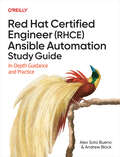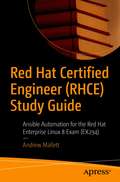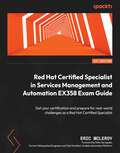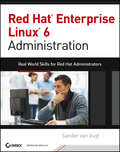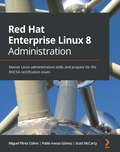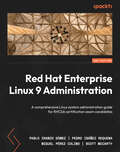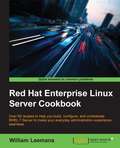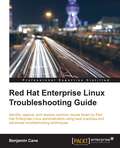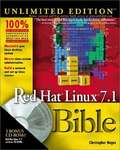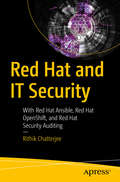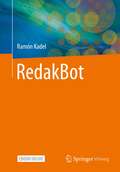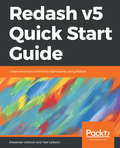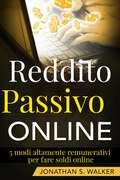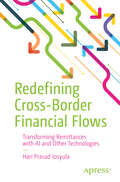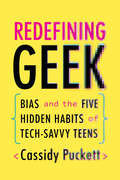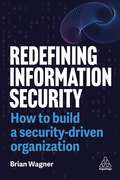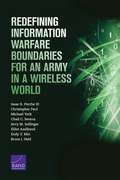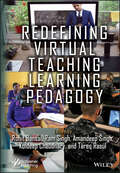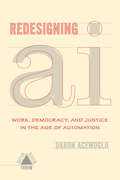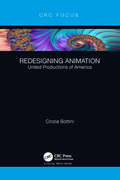- Table View
- List View
Red Dead Redemption (Boss Fight Books)
by Matt MarginiFirst garnering both dismissal and intrigue as &“Grand Theft Horse,&” Rockstar Games&’ 2010 action-adventure Red Dead Redemption was met on its release with critical acclaim for its open-world gameplay, its immersive environments, and its authenticity to the experience of the Wild West. Well, the simulated Wild West, that is. Boss Fight invites you to find out how the West was created, sold, and marketed to readers, moviegoers, and gamers as a space where &“freedom&” and &“progress&” duel for control of the dry, punishing frontier. Join writer and scholar Matt Margini as he journeys across the broad and expansive genre known as the Western, tracing the lineage of the familiar self-sufficient loner cowboy from prototypes like Buffalo Bill, through golden age icons like John Wayne and antiheroes like Clint Eastwood&’s &“Man with No Name,&” up to Red Dead&’s John Marston. With a critical reading of Red Dead&’s narrative, setting, and gameplay through the lens of the rich and ever-shifting genre of the Western, Margini reveals its connections to a long legacy of mythmaking that has colored not only the stories we love to consume, but the histories we tell about America.
Red Hat Certified Engineer (RHCE) Ansible Automation Study Guide
by Andrew Block Alex Soto BuenoWith the Ansible automation tool, developers and system administrators in the enterprise can automate the provisioning, configuration, and management of distributed and on-premises systems. This study guide prepares you for the Red Hat Certified Engineer (RHCE) certification exam, 90% of which covers Ansible. Red Hat's Alex Soto Bueno and Andrew Block walk you through all the material covered in the exam. You'll begin with foundational concepts that build on one another and then dive into specific exam topics. The performance-based RHCE exam requires a deep knowledge of Ansible systems and tasks under time pressure. This comprehensive guide is the ideal way to prepare. Learn how Ansible can simplify your day-to-day operations Solve real-world Ansible problems in a hands-on command-line environment Install Ansible and set up managed environments Use ad hoc commands and include them in scripts as requested in the exam Prepare your Ansible configuration file and inventory file Set up and prepare nodes, including SSH key-based authentication Install required Ansible packages
Red Hat Certified Engineer (RHCE) Study Guide: Ansible Automation for the Red Hat Enterprise Linux 8 Exam (EX294)
by Andrew MallettStudy the material in this book to prepare for the RHCE exam EX294 and to learn how using Ansible within your own environment improves system administration productivity.This book covers all of the objectives of the exam and extends further, ensuring that you know how to use Ansible to manage Linux. The book uses CentOS, a Red Hat-based distribution, and Ubuntu instead of using a single Red Hat distribution. By using the two distributions, you will understand the power of Ansible and how easily you can deal with multiple platforms, which is crucial for your understanding of Ansible in the real world. The book assumes no previous knowledge of Ansible but some knowledge of Linux system administration from the command line. You will learn how to manage Linux systems that are installed with different distributions, including CentOS Enterprise Linux 8 and Ubuntu 18.04. You will be able to manage these systems using ad hoc commands from the command line as well as creating Ansible playbooks that can be replayed reliably many times. To save on the code that you have to create, you will learn how to use Ansible Galaxy to search for and download roles and collections that are pre-written to manage elements of your Linux installations. By the end of this book, you will be able to write efficient and effective YAML playbooks to manage your entire estate.What You Will Learn Prepare systems so that password-less access can be used with Ansible remotely Use ad hoc commands to quickly configure systems Use and format YAML files correctly Create playbooks that grow in their complexity as your experience develops Ensure that services are restarted on configuration changesWho This Book Is ForThose who want to prepare for the RHCE exam EX294 and readers who want to learn how to use Ansible to improve the productivity of their system administration. This book will help you prepare yourself for the exam as well as your real-life administration needs.
Red Hat Certified Specialist in Services Management and Automation EX358 Exam Guide: Get your certification and prepare for real-world challenges as a Red Hat Certified Specialist
by Eric McLeroy Peter SprygadaGain the skills and knowledge to manage your core network services on Red Hat Enterprise Linux with help of self-tests and practical use casesKey FeaturesGet the EX358 certification with this easy-to-follow guide while preparing for real-life challengesLearn everything you need to know about Linux system administration and automation using Ansible 2.9Use practical use cases and exam-focused questions to prepare for the certification examBook DescriptionIf you're ready to take the next step in your system engineering career with the EX358, then this book is for you. Packed with all the knowledge and skills that you need to configure and maintain services and applications on the Red Hat Linux 8 (RHEL OS 8) platform, this book will help you ace the exam and thrive at work.Red Hat Certified Specialist in Service Management and Automation will help you build a solid foundation of the most recent and up-to-date exam requirements and practice questions.Throughout the course of the book, you'll get hands-on experience with different technical processes needed to fully administer a Red Hat Enterprise Linux 8 system. This will include file storage, database management, direct configuration of applications, such as SMB shares, networking. You'll be well equipped with the configuration of essential components like firewall, SELinux, and iSCSI while learning how to automate these tasks using Ansible Automation 2.9 in order to alleviate the burden of completing them by hand.By the end of this book, you'll have covered all essential topics to ace the Red Hat EX358 certification exam and add another feather to your career as a Red Hat Certified Specialist.What you will learnAttain the skills to take and pass the Red Hat EX358 certification examBecome familiar with the ways of leveraging Ansible Core 2.9Gain deeper knowledge of the Red Hat Linux Networking with DNS, DHCP, and IP addressingCreate your own link and master the networking domain through link aggregation creationSet up printers and email services through Linux serversGet up and running with MariaDB SQL databasesExplore how to create and control web trafficWho this book is forThis book is for you if you want to advance your career by adding the essential Red Hat certificate to your resume. It will be particularly useful for system administrators responsible for managing large enterprise environments, network services and Red Hat Certified Engineers interested in becoming a Red Hat Certified Architect (RHCA). Before reading this book, you must have a working knowledge of Red Hat Enterprise Linux and Ansible Automation and command line usage of Red Hat Enterprise Linux systems administration.
Red Hat Enterprise Linux 6 Administration
by Sander Van VugtThe definitive guide to administering a Red Hat Enterprise Linux 6 networkLinux professionals who need a go-to guide on version 6 of Red Hat Enterprise Linux (RHEL) will find what they need in this comprehensive Sybex book. It covers RHEL administration in detail, including how to set up and manage web and mail services, use RHEL in enterprise environments, secure it, optimize storage, configure for virtualization and high availability, and much more. It also provides a great study aid for those preparing for either the RHCSA or RHCE certification exam.Red Hat is the Linux market leader, and Red Hat administrators are in demandThis Sybex guide is a comprehensive resource on Red Hat Enterprise Linux administration and useful for those preparing for one of the Red Hat certification examsCovers setting up and managing web and mail services, using RHEL in enterprise environments, securing RHEL, and optimizing storage to fit your environmentExplores advanced RHEL configurations, including virtualization and high availabilityRed Hat Enterprise Linux 6 Administration is the guide Linux professionals and Red Hat administrators need to stay current on the newest version.
Red Hat Enterprise Linux 8 Administration: Master Linux administration skills and prepare for the RHCSA certification exam
by Miguel Perez Colino Pablo Iranzo Gomez Scott McCartyDevelop the skill to manage and administer Red Hat Enterprise Linux and get ready to achieve the RHCSA certificationKey FeaturesLearn the most common administration and security tasks and manage enterprise Linux infrastructures efficientlyAssess your knowledge using self-assessment questions based on real-world examplesUnderstand how to apply the concepts of core systems administration in the real worldBook DescriptionWhether in infrastructure or development, as a DevOps or site reliability engineer, Linux skills are now more relevant than ever for any IT job, forming the foundation of understanding the most basic layer of your architecture. With Red Hat Enterprise Linux (RHEL) becoming the most popular choice for enterprises worldwide, achieving the Red Hat Certified System Administrator (RHCSA) certification will validate your Linux skills to install, configure, and troubleshoot applications and services on RHEL systems.Complete with easy-to-follow tutorial-style content, self-assessment questions, tips, best practices, and practical exercises with detailed solutions, this book covers essential RHEL commands, user and group management, software management, networking fundamentals, and much more. You'll start by learning how to create an RHEL 8 virtual machine and get to grips with essential Linux commands. You'll then understand how to manage users and groups on an RHEL 8 system, install software packages, and configure your network interfaces and firewall. As you advance, the book will help you explore disk partitioning, LVM configuration, Stratis volumes, disk compression with VDO, and container management with Podman, Buildah, and Skopeo.By the end of this book, you'll have covered everything included in the RHCSA EX200 certification and be able to use this book as a handy, on-the-job desktop reference guide.This book and its contents are solely the work of Miguel Perez Colino, Pablo Iranzo Gomez, and Scott McCarty. The content does not reflect the views of their employer (Red Hat Inc.). This work has no connection to Red Hat, Inc. and is not endorsed or supported by Red Hat, Inc.What you will learnDeploy RHEL 8 in different footprints, from bare metal and virtualized to the cloudManage users and software on local and remote systems at scaleDiscover how to secure a system with SELinux, OpenSCAP, and firewalldGain an overview of storage components with LVM, Stratis, and VDOMaster remote administration with passwordless SSH and tunnelsMonitor your systems for resource usage and take actions to fix issuesUnderstand the boot process, performance optimizations, and containersWho this book is forThis book is for IT professionals or students who want to start a career in Linux administration and anyone who wants to take the RHCSA 8 certification exam. Basic knowledge of Linux and familiarity with the Linux command-line is necessary.
Red Hat Enterprise Linux 8 Administration: Master Linux administration skills and prepare for the RHCSA certification exam
by Scott McCarty Miguel Pérez Colino Pablo Iranzo GómezDevelop the skills to manage and administer Red Hat Enterprise Linux and get ready to earn the RHCSA certification Key FeaturesLearn the most common administration and security tasks and manage enterprise Linux infrastructures efficientlyAssess your knowledge using self-assessment questions based on real-world examplesUnderstand how to apply the concepts of core systems administration in the real worldBook DescriptionWhether in infrastructure or development, as a DevOps or site reliability engineer, Linux skills are now more relevant than ever for any IT job, forming the foundation of understanding the most basic layer of your architecture. With Red Hat Enterprise Linux (RHEL) becoming the most popular choice for enterprises worldwide, achieving the Red Hat Certified System Administrator (RHCSA) certification will validate your Linux skills to install, configure, and troubleshoot applications and services on RHEL systems. Complete with easy-to-follow tutorial-style content, self-assessment questions, tips, best practices, and practical exercises with detailed solutions, this book covers essential RHEL commands, user and group management, software management, networking fundamentals, and much more. You'll start by learning how to create an RHEL 8 virtual machine and get to grips with essential Linux commands. You'll then understand how to manage users and groups on an RHEL 8 system, install software packages, and configure your network interfaces and firewall. As you advance, the book will help you explore disk partitioning, LVM configuration, Stratis volumes, disk compression with VDO, and container management with Podman, Buildah, and Skopeo. By the end of this book, you'll have covered everything included in the RHCSA EX200 certification and be able to use this book as a handy, on-the-job desktop reference guide. This book and its contents are solely the work of Miguel Pérez Colino, Pablo Iranzo Gómez, and Scott McCarty. The content does not reflect the views of their employer (Red Hat Inc.). This work has no connection to Red Hat, Inc. and is not endorsed or supported by Red Hat, Inc.What you will learnDeploy RHEL 8 in different footprints, from bare metal and virtualized to the cloudManage users and software on local and remote systems at scaleDiscover how to secure a system with SELinux, OpenSCAP, and firewalldGain an overview of storage components with LVM, Stratis, and VDOMaster remote administration with passwordless SSH and tunnelsMonitor your systems for resource usage and take actions to fix issuesUnderstand the boot process, performance optimizations, and containersWho this book is forThis book is for IT professionals or students who want to start a career in Linux administration and anyone who wants to take the RHCSA 8 certification exam. Basic knowledge of Linux and familiarity with the Linux command-line is necessary.
Red Hat Enterprise Linux 9 Administration: A comprehensive Linux system administration guide for RHCSA certification exam candidates, 2nd Edition
by Miguel Perez Colino Pablo Iranzo Gomez Scott McCarty Pedro Ibanez RequenaDevelop the skills required to administer your RHEL environment on-premises and in the cloud while preparing for the RHCSA examPurchase of the print or Kindle book includes a free eBook in PDF formatKey FeaturesBecome a pro at system administration from installation to container managementSecure and harden your Linux environment using SSH, SELinux, firewall, and system permissionsGain confidence to pass the RHCSA exam with the help of practice testsBook DescriptionWith Red Hat Enterprise Linux 9 becoming the standard for enterprise Linux used from data centers to the cloud, Linux administration skills are in high demand. With this book, you'll learn how to deploy, access, tweak, and improve enterprise services on any system on any cloud running Red Hat Enterprise Linux 9.Throughout the book, you'll get to grips with essential tasks such as configuring and maintaining systems, including software installation, updates, and core services. You'll also understand how to configure the local storage using partitions and logical volumes, as well as assign and deduplicate storage. You'll learn how to deploy systems while also making them secure and reliable.This book provides a base for users who plan to become full-time Linux system administrators by presenting key command-line concepts and enterprise-level tools, along with essential tools for handling files, directories, command-line environments, and documentation for creating simple shell scripts or running commands. With the help of command line examples and practical tips, you'll learn by doing and save yourself a lot of time.By the end of the book, you'll have gained the confidence to manage the filesystem, users, storage, network connectivity, security, and software in RHEL 9 systems on any footprint.What you will learnBecome well versed with the fundamentals of RHEL9—from system deployment to user managementSecure a system by using SELinux policies and configuring firewall rulesUnderstand LVM to manage volumes and maintain VDO deduplicationManage a system remotely using SSH and public key authenticationGet the hang of the boot process and kernel tunable to adjust your systemsAutomate simple tasks using scripts or Ansible PlaybooksWho this book is forThis book is for Red Hat Enterprise Linux system administrators and Linux system administrators. It's also a good resource for any IT professional who wants to learn system administration. RHCSA certification candidates will find this book useful in their preparation for the certification exam.
Red Hat Enterprise Linux Server Cookbook
by William LeemansOver 60 recipes to help you build, configure, and orchestrate RHEL 7 Server to make your everyday administration experience seamless About This Book * Create fully unattended installations and deploy configurations without breaking a sweat * Discover and kick-start the newest RHEL 7 configuration and management tools through an easy-to-follow, practical approach for a lazy system management * Be guided by an experienced RHEL expert who is a certified Linux engineer with a passion for open source and open standards Who This Book Is For Red Hat Enterprise Linux Server Cookbook is for RHEL 7 system administrators and DevOps in need of a practical reference guide to troubleshoot common issues and quickly perform tasks. What You Will Learn * Set up and configure RHEL 7 Server * Use NetworkManager to configure all aspects of your network * Manage virtual environments using libvirt * Set up software repositories * Secure and monitor your RHEL environment * Configure SELinux, and create and apply its policies * Create kickstart scripts to automatically deploy RHEL 7 systems * Use Orchestration and configuration management tools to manage your environment In Detail Dominating the server market, the Red Hat Enterprise Linux operating system gives you the support you need to modernize your infrastructure and boost your organization's efficiency. Combining both stability and flexibility, RHEL helps you meet the challenges of today and adapt to the demands of tomorrow. This practical Cookbook guide will help you get to grips with RHEL 7 Server and automating its installation. Designed to provide targeted assistance through hands-on recipe guidance, it will introduce you to everything you need to know about KVM guests and deploying multiple standardized RHEL systems effortlessly. Get practical reference advice that will make complex networks setups look like child's play, and dive into in-depth coverage of configuring a RHEL system. Also including full recipe coverage of how to set up, configuring, and troubleshoot SELinux, you'll also discover how secure your operating system, as well as how to monitor it. Style and approach This practical guide is packed full of hands-on recipes that provide quick solutions to the problems faced when building your RHEL 7 system from scratch using orchestration tools. Each topic is explained sequentially in the process of setting up a system and binding everything together.
Red Hat Enterprise Linux Troubleshooting Guide
by Benjamin CaneIdentify, capture and resolve common issues faced by Red Hat Enterprise Linux administrators using best practices and advanced troubleshooting techniquesAbout This BookDevelop a strong understanding of the base tools available within Red Hat Enterprise Linux (RHEL) and how to utilize these tools to troubleshoot and resolve real-world issuesGain hidden tips and techniques to help you quickly detect the reason for poor network/storage performanceTroubleshoot your RHEL to isolate problems using this example-oriented guide full of real-world solutionsWho This Book Is ForIf you have a basic knowledge of Linux from administration or consultant experience and wish to add to your Red Hat Enterprise Linux troubleshooting skills, then this book is ideal for you. The ability to navigate and use basic Linux commands is expected.What You Will LearnIdentify issues that need rapid resolution against long term root cause analysisDiscover commands for testing network connectivity such as telnet, netstat, ping, ip and curlSpot performance issues with commands such as top, ps, free, iostat, and vmstatUse tcpdump for traffic analysisRepair a degraded file system and rebuild a software raidIdentify and troubleshoot hardware issues using dmesgTroubleshoot custom applications with strace and knowledge of Linux resource limitationsIn DetailRed Hat Enterprise Linux is an operating system that allows you to modernize your infrastructure, boost efficiency through virtualization, and finally prepare your data center for an open, hybrid cloud IT architecture. It provides the stability to take on today's challenges and the flexibility to adapt to tomorrow's demands.In this book, you begin with simple troubleshooting best practices and get an overview of the Linux commands used for troubleshooting. The book will cover the troubleshooting methods for web applications and services such as Apache and MySQL. Then, you will learn to identify system performance bottlenecks and troubleshoot network issues; all while learning about vital troubleshooting steps such as understanding the problem statement, establishing a hypothesis, and understanding trial, error, and documentation. Next, the book will show you how to capture and analyze network traffic, use advanced system troubleshooting tools such as strace, tcpdump & dmesg, and discover common issues with system defaults.Finally, the book will take you through a detailed root cause analysis of an unexpected reboot where you will learn to recover a downed system.Style and approachThis is an easy-to-follow guide packed with examples of real-world core Linux concepts. All the topics are presented in detail while you're performing the actual troubleshooting steps.
Red Hat Linux 7.1 Bible, Unlimited Edition
by Christopher MegusComplete guide to using Red Hat Linux
Red Hat Linux 9: Red Hat Linux x86 Installation Guide
by Red Hat Inc.Installation manual for Red Hat Linux 9
Red Hat and IT Security: With Red Hat Ansible, Red Hat OpenShift, and Red Hat Security Auditing
by Rithik ChatterjeeUse Red Hat’s security tools to establish a set of security strategies that work together to help protect your digital data. You will begin with the basic concepts of IT security and DevOps with topics such as CIA triage, security standards, network and system security controls and configuration, hybrid cloud infrastructure security, and the CI/CD process. Next, you will integrate and automate security into the DevOps cycle, infrastructure, and security as code. You will also learn how to automate with Red Hat Ansible Automation Platform and about hybrid cloud infrastructure. The later chapters will cover hyper-converged infrastructure and its security, Red Hat Smart Management, predictive analytics with Red Hat Insights, and Red Hat security auditing to ensure best security practices. Lastly, you will see the different types of case studies with real-world examples.Red Hat and IT Security will help you get a better understanding of IT security concepts from a network and system administration perspective. It will help you to understand how the IT infrastructure landscape can change by implementing specific security best practices and integrating Red Hat products and solutions to counter against modern cybersecurity threats.What You Will Learn● Understand IT infrastructure security and its best practices● Implement hybrid cloud infrastructure ● Realign DevOps process into DevSecOps, emphasizing security● Implement automation in IT infrastructure services using Red Hat Ansible● Explore Red Hat Smart Management, predictive analytics, and auditingWho This Book Is For IT professionals handling network/system administration or the IT infrastructure of an organization. DevOps professionals and cybersecurity analysts would find the book useful.
Red vs. Blue Apple FF: The Ultimate Fan Guide
by Rooster Teeth Eddy Rivas Burnie BurnsIn Red vs. Blue, its creators at Rooster Teeth brings together more than a decades' worth of ephemera and behind-the-scenes information from the popular comedic web series, including:Character dossiers and fact sheetsCharacter-driven lists, including "The Wisdom of Caboose"Charts and statistics mapping out character, world, and episode triviaBest Red vs. Blue quotes. Of all timeAlternate stories and character arcs that were abandonedSpotlights on the cast and crew of Red vs. Blue, filled with unique anecdotes, behind-the-scenes stories, and insights into the series and their roleNew, never-before-seen content: Includes annotated scripts of some of the most-watching episodes, side-stores, expanded universe material, alternate endings, deleted scenes and triviaOriginal sketches and drawings
RedakBot
by Ramón KadelDer Journalismus ist im Wandel – nicht nur aufgrund des Medienstrukturwandels durch Digitalisierung und Internet, sondern auch aufgrund neuer Technologien, die erstmals sogar ein Stück weit die Existenzberechtigung des Berufsbilds infrage stellen. Werden Journalisten also durch künstliche Intelligenz ersetzt? Nein! Denn KI im Journalismus ist ein „Frenemy“: Freund und Feind zugleich. Freund, wenn man sich auf den KI-Journalismus vorbereitet, Feind für diejenigen, die ihr Mindset nicht ändern können und die neuen Technologien ausschließlich als Bedrohung sehen. Mit der Lektüre dieses Buches sollen Journalisten und Redakteure sowie Volontäre und Studenten im Bereich der Kommunikationswissenschaften konkrete Ideen im Kopf haben, wie sie sich auf die Zeit des KI-Journalismus erfolgreich vorbereiten. Es regt an, innovativ zu sein, und von den neuen Möglichkeiten, die redaktionelle Bots bieten, zu partizipieren – und schließlich zu profitieren. Die Frage ist nicht, ob „RedakBots“ unsere Arbeitswelt verändern, sondern wann dies passiert. Das Buch bereitet darauf vor.
Redash v5 Quick Start Guide: Create and share interactive dashboards using Redash
by Alexander Leibzon Yael LeibzonLearn how to quickly generate business intelligence, insights and create interactive dashboards for digital storytelling through various data sources with RedashKey FeaturesLearn the best use of visualizations to build powerful interactive dashboardsCreate and share visualizations and data in your organizationWork with different complexities of data from different data sourcesBook DescriptionData exploration and visualization is vital to Business Intelligence, the backbone of almost every enterprise or organization. Redash is a querying and visualization tool developed to simplify how marketing and business development departments are exposed to data. If you want to learn to create interactive dashboards with Redash, explore different visualizations, and share the insights with your peers, then this is the ideal book for you.The book starts with essential Business Intelligence concepts that are at the heart of data visualizations. You will learn how to find your way round Redash and its rich array of data visualization options for building interactive dashboards. You will learn how to create data storytelling and share these with peers. You will see how to connect to different data sources to process complex data, and then visualize this data to reveal valuable insights. By the end of this book, you will be confident with the Redash dashboarding tool to provide insight and communicate data storytelling.What you will learnInstall Redash and troubleshoot installation errorsManage user roles and permissionsFetch data from various data sourcesVisualize and present data with RedashCreate active alerts based on your dataUnderstand Redash administration and customizationExport, share and recount stories with Redash visualizationsInteract programmatically with Redash through the Redash APIWho this book is forThis book is intended for Data Analysts, BI professionals and Data Developers, but can be useful to anyone who has a basic knowledge of SQL and a creative mind. Familiarity with basic BI concepts will be helpful, but no knowledge of Redash is required.
Reddito Passivo Online: 5 modi altamente remunerativi per fare soldi online
by Jonathan S. WalkerImpara i segreti per fare reddito passivo online oggi e inizia a fare soldi! Reddito passivo online: 5 modi altamente redditizi per fare soldi online Impara i segreti per fare reddito passivo online oggi e inizia a fare soldi! Sei stanco di lavorare come un cane, correndo come un pazzo come tutti gli altri là fuori? Scambi tempo per guadagnare soldi giorno dopo giorno, sacrificando tempo di qualità con amici e familiari e non avendo mai abbastanza da spendere con i vostri cari? Cosa succede se ti dico che esiste un modo per costruire un impero del reddito passivo on-line senza dover lasciare il lavoro di tutti i giorni? Il reddito passivo online è la soluzione definitiva. Per essere IL ragazzo di cui tutti sono invidiosi, è necessario iniziare a costruire un reddito passivo online OGGI. Ci vuole tempo per far crescere un'azienda da zero e questo libro ti fornirà i passi esatti che dovrai fare per iniziare quel viaggio. In questo libro imparerai: 5 Fonti redditizie per la creazione di flussi di reddito passivi online Strategie specifiche su come far crescere le aziende Costruire blog redditizi Costruire un impero commerciale e vendere con l'FBA Come creare un sito membership Come fare soldi vendendo Ebook su Amazon Kindle Store Come impostare un canale Youtube redditizio Risultati della creazione di reddito passivo online: Essere in grado di viaggiare per il mondo Realizzare i tuoi sogni Avere sicurezza finanziaria Essere finanziariamente senza stress Acquistare tutto quello che vuoi in qualsiasi momento Stai per ottenere queste strategie e grazie a tutta questa conoscenza a portata di mano farai il salto di qualità e diventerai finanziariamente libero, con un reddito passivo disponibile ogni giorno. Qualcuno che è in pensione prima dei 40 anni e ha il tempo e la libertà di vivere la vita al massimo con i loro cari. Affretta
Redeem All: How Digital Life Is Changing Evangelical Culture
by Corrina LaughlinRedeem All examines the surprising intersection of American evangelicalism and tech innovation. Corrina Laughlin looks at the evangelical Christians who are invested in imagining, using, hacking, adapting, and creating new media technologies for religious purposes. She finds that entrepreneurs, pastors, missionaries, and social media celebrities interpret the promises born in Silicon Valley through the framework of evangelical culture and believe that digital media can help them (to paraphrase Steve Jobs) put their own dent in the universe. Laughlin introduces readers to "startup churches" hoping to reach a global population, entrepreneurs coding for a deeper purpose, digital missionaries networking with mobile phones, and Christian influencers and podcasters seeking new forms of community engagement. Redeem All reveals how evangelicalism has changed as it eagerly adopts the norms of the digital age.
Redefining Cross-Border Financial Flows: Transforming Remittances with AI and Other Technologies
by Hari Prasad JosyulaAnalyse how AI and other cutting-edge technologies affect the complex web of international financial transactions. The global remittance sector and artificial intelligence (AI) work together in a way that is testament to the revolutionary force of innovation in the always changing financial and technology landscape. As we stand at the threshold of a new age, this book aims to explore the layers of complexity underlying the confluence of AI and remittances. Your investigation will go beyond the current state of affairs and into the future, whereby predictive analytics and autonomous financial transactions will fundamentally alter the way that we send and receive money internationally. This process's incorporation of AI technology represents a revolution rather than a simple progression, one that might improve millions of people's lives by streamlining, securing, and lowering the cost of financial transactions. This book breaks down the complex workings of AI prediction models, reveals how blockchain integration may be used to facilitate safe and transparent transactions, and examines how biometric authentication can strengthen the security of financial transactions. It dives into the complexities of regulatory compliance, understanding the difficult balance between innovation and conformity to existing standards. When machines carry out transactions based on complex algorithms and current market circumstances, what does it entail for people and economies? What effect does this change have on how people make financial decisions? This book is an invitation to imagine a future in which financial systems are not just efficient but also naturally intelligent. It is a call to reflect on the moral ramifications, the effects on society, and the obligations that accompany the dawn of a new era of financial opportunity. Remittances are about to undergo a revolution, and you have a crucial role to play in determining how this will play out. What You’ll Learn Understand the integration of AI and other technology in remittances to enhance efficiency, security, and cost-effectiveness of cross-border financial transactions. Examine the impact of AI-driven cross border flows on global economic development, particularly in communities heavily reliant on remittances. Investigate the social benefits and potential challenges posed by AI in maintaining or altering familial and community ties through remittance flows Critically evaluate regulatory and ethical challenges while fostering innovation and adhering to existing financial laws and standards. Explore future scenarios where AI governs autonomous financial transactions and the role of humans in an AI-driven financial ecosystem. Debate how such changes might redefine personal and communal financial interactions. Who This Book Is For FinTech practitioners, Finance students, professionals in working in Payments and/or Remittances
Redefining Geek: Bias and the Five Hidden Habits of Tech-Savvy Teens
by Cassidy PuckettA surprising and deeply researched look at how everyone can develop tech fluency by focusing on five easily developed learning habits.Picture a typical computer geek. Likely white, male, and someone you’d say has a “natural instinct” for technology. Yet, after six years teaching technology classes to first-generation, low-income middle school students in Oakland, California, Cassidy Puckett has seen firsthand that being good with technology is not something people are born with—it’s something they learn. In Redefining Geek, she overturns the stereotypes around the digitally savvy and identifies the habits that can help everyone cultivate their inner geek.Drawing on observations and interviews with a diverse group of students around the country, Puckett zeroes in on five technology learning habits that enable tech-savvy teens to learn new technologies: a willingness to try and fail, management of frustration and boredom, use of models, and the abilities to use design logic and identify efficiencies. In Redefining Geek, she shows how to measure and build these habits, and she demonstrates how many teens historically marginalized in STEM are already using these habits and would benefit from recognition for their talent, access to further learning opportunities, and support in career pathways. She argues that if we can develop, recognize, and reward these technological learning habits in all kids—especially girls and historically marginalized racial and ethnic groups—we can address many educational inequities and disparities in STEM.Revealing how being good with technology is not about natural ability but habit and persistence, Redefining Geek speaks to the ongoing conversation on equity in technology education and argues for a more inclusive technology learning experience for all students.
Redefining Information Security: How to Build a Security-Driven Organization
by Brian WagnerRedefining Information Security shows security and technology leaders how to build a security-driven culture that not only safeguards but actively propels businesses forward, enabling innovation and growth in the face of an evolving digital business and threat landscape.This book pioneers a transformative approach that shields organizations from risks but also actively leverages them to drive competitive advantages. Redefining Information Security addresses the technical aspects of cybersecurity in addition to the organizational culture, leadership, communication, education and human factors that make up the integral components of a successful security strategy. It offers a strong emphasis on practical implementation, providing actionable guidance and tools to apply proactive security strategies.Redefining Information Security offers insights on integrating security into technology roadmaps and leveraging it as a growth catalyst. It introduces innovative risk management strategies, allowing organizations to navigate uncertainties while maintaining a robust security posture. This guide presents a wealth of real-word examples that provide insights into how organizations at the forefront of security innovation integrate and embed security within their strategic vision and explores how security can evolve to meet the challenges of tomorrow's digital landscape.
Redefining Information Warfare Boundaries For An Army In A Wireless World
by Christopher Paul Endy Y. Min Jerry M. Sollinger Bruce J. Held Isaac R. Porche III Michael York Chad C. Serena Elliot AxelbandThe U. S. Army is studying ways to apply its cyber power and is reconsidering doctrinally defined areas that are integral to cyberspace operations. An examination of network operations, information operations, and several other, more focused areas across the U. S. military found significant overlap and potential boundary progression that could inform the development of future Army doctrine.
Redefining Virtual Teaching Learning Pedagogy
by Ram Singh Rohit Bansal Amandeep Singh Kuldeep Chaudhary Tareq RasulRedefining Virtual Teaching Learning Pedagogy Online education is now a growing and critical piece of modern-day infrastructure and this book details how virtual teaching and learning can continue to be transformed through leveraging digital platforms. In the current technology-driven era, education systems are undergoing major changes by adopting advanced digital education strategies. Schools, colleges, and universities around the world have swiftly switched to online delivery modes. Students are learning via new platforms and the use of narrated lectures, podcasts, online quizzes, and other e-learning materials has increased. Virtual learning improves the educational experience, transforms teaching and learning, and provides rich, diverse, and flexible learning opportunities for the digital generation. It also makes students able to gain, share and verify knowledge through different sources such as social media communities, blogging, web-based content writing, video-based learning, etc. The main focus of “Redefining Virtual Teaching Learning Pedagogy” is to bring together leading academic scientists, researchers, and research scholars to exchange and share their experiences and results on all aspects of virtual learning and teaching. The chapters mainly focus on 6 critical areas of virtual teaching and learning: Curriculum and learning objectives Learning materials Pedagogic processes Classroom assessment frameworks Teacher support in the classrooms School leadership and management development. Audience Educators, researchers, academicians, entrepreneurs, and corporate professionals will gain knowledge and be updated about the role & future of virtual teaching and learning and the latest digital tools used for that purpose.
Redesigning AI (Boston Review / Forum)
by Daron AcemogluA look at how new technologies can be put to use in the creation of a more just society.Artificial Intelligence (AI) is not likely to make humans redundant. Nor will it create superintelligence anytime soon. But it will make huge advances in the next two decades, revolutionize medicine, entertainment, and transport, transform jobs and markets, and vastly increase the amount of information that governments and companies have about individuals. AI for Good leads off with economist and best-selling author Daron Acemoglu, who argues that there are reasons to be concerned about these developments. AI research today pays too much attention to the technological hurtles ahead without enough attention to its disruptive effects on the fabric of society: displacing workers while failing to create new opportunities for them and threatening to undermine democratic governance itself. But the direction of AI development is not preordained. Acemoglu argues for its potential to create shared prosperity and bolster democratic freedoms. But directing it to that task will take great effort: It will require new funding and regulation, new norms and priorities for developers themselves, and regulations over new technologies and their applications.At the intersection of technology and economic justice, this book will bring together experts--economists, legal scholars, policy makers, and developers--to debate these challenges and consider what steps tech companies can do take to ensure the advancement of AI does not further diminish economic prospects of the most vulnerable groups of population.
Redesigning Animation: United Productions of America (The Focus Animation Series)
by Cinzia BottiniThe animation studio United Productions of America (UPA) was able to challenge Disney supremacy in the 1950s entertainment market by creating cutting-edge animated cartoons. UPA films express a simplified audiovisual language consisting of stylized layout designs, asymmetrical compositions, colors applied flatly and in contrast with each other, limited animation and a minimalist use of sound effects. UPA artists developed this innovative style by assimilating those aesthetic features already expressed by Modern painters, graphic designers and advertisers. This book considers UPA films as Modern animations, because they synthesize a common minimalist tendency that was occurring in US animation during the 1940s and 1950s. It examines the conditions under which UPA studio flourished and the figure of its executive producer Stephen Bosustow; the influence of Modernist stylistic features of painting, graphic design and poster advertising on UPA animations; and UPA animated cartoons as case studies of a simplified audiovisual language that influenced 1950s-1960s international productions. Key Features Looks at UPA's origins during the 1940s and postwar American stage, and how this influences later Modern movements and styles Learn about the production methods of UPA and its lasting graphic contribution to animation history Discover how UPA audiovisual styles were born from the assimilation of Modern paintings, graphic art, and poster advertising Explores how UPA influenced animation in other parts of the world, including Romania, Russia, and Japan Highlights the impact UPA had on styles with famous international legends like Dušan Vukotić, Fyodor Khitruk, and Osamu Tezuka

